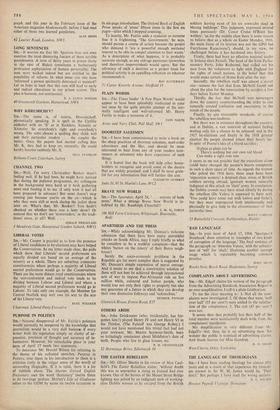PURPOSE IN POLITICS SIR,—Natural disapproval of Mr. Fairlie's polemics would
normally be tempered by the knowledge that journalism would be a very dull' business if every writer built his reputation simply on clarity of ex- pression, precision of thought and accuracy of in- formation. However, his remarkable piece in your issue of April 17 needs two comments.
To denounce Mr. Harold Wilson for referring to the theme of his collected speeches, Purpose in Politics, nine times in his introduction to them is a criticism (only in the vulgar sense of the word) of astounding illogicality. If it is valid, there is a lot of rubbish about. The Shorter Oxford English Dictionary uses the word 'dictionary' twelve times in its two-page preface. Morley's Life of Gladstone refers to the GOM by name on twelve occasions in its six-page introduction. The Oxford Book of English Prose speaks of 'prose' fifteen times in the first six pages—after which I stopped counting.
To inanity, Mr. Fairlie adds a cynicism so extreme that it is frightening. 'The Government,' he says, should pursue a course of action because the people who demand it 'are a powerful enough sectional interest to be able to compel attention to their wants.' As a description of what happens, it is probably accurate enough, as any old-age pensioner (powerless and therefore impoverished) would agree. But the advocacy of such a doctrine as a proper basis for political activity is an appalling reflection on whoever recommends it.














































 Previous page
Previous page